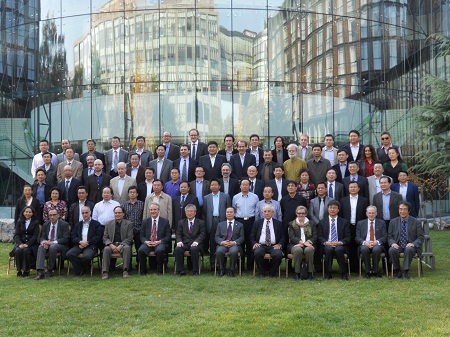Peking University, Oct. 27, 2012: The opening ceremony of the Global Meeting of Chairs of Philosophy Departments held in the Conference hall of the Lakeview Hotel, Peking University (PKU) this afternoon. About 80 scholars from various universities of USA, UK, Russia,France, Germany, Australia, Turkey, Sweden, Finland, Belgium, Israel, India, Japan, Korea, as well as the host country China took part in the ceremony and will continue to discuss on more detailed issues in the next 2 days.
The major theme of this international conference is “Philosophical Education and Contemporary Society”, which will be dealt in 4 panel proposals: Challenge to philosophical education and our reaction; Philosophical research from a trans-disciplinary perspective; Philosophical exchange in the era of globalization; Chinese philosophy in philosophical education.
PKU president Zhou Qifeng addressed at the ceremony and he hoped that the communication and discussion of philosophers from all over the world would promote the understandings between each other as well as the harmony among different cultures and civilizations, which could contribute to a better future of our world.

Three invited speeches were given by scholars from PKU, the University of California at Berkeley (UC Berkeley) and Beijing Foreign Studies University.
Prof. Wang Bo, Chair of the Department of Philosophy, and of Religious Studies, talked about Chinese Philosophy Education at PKU. He said that the biggest background that Chinese philosophy was faced with in the past 100 years was the conflict of thoughts between Eastern and Western world.
"Chinese philosophy should be of philosophy, but it should also be of Chinese. It should have something unique, while sharing the common characters,” he said, “philosophy is just like a tribe containing different families, though things are different inside, a common ‘source’ can always be found.” He emphasized that western philosophy is actually part of Chinese now, and it is of great importance for Chinese philosophers to combine two different traditions while inheriting our own traditions in the new age. At last, he highlighted the point of the relationship between speculation and life.
"The Present and Future of Philosophy” was the speech presented by prof. John Searle from UC Berkeley. He considered that the current national identity of philosophy is much less important than 100 or 200 years ago, and then elaborated the point through his own personal experiences.
"The central influential fact about the present era is that now age grows; we now know a lot more than what our grandparents did and our grandchildren will know more than we do,” added prof. John, “but now there’s a peculiar attention that has grown out of this growth in nowadays and that is if we take the knowledge that we have as basic facts of the nature in chemical form and structure of carbon basic molecules, it seems that the complete attention that we are knowledgeable of basic facts in physics and chemistry and certain conceptions we have of ourselves, the knowledge of the basic facts presents the world to us as consistence of mindless, meaningless, physical particles. But we think ourselves as conscious, rational, social, ethical, linguistic, esthetic, as human beings. Now how do we reconcile these two pictures or in case we can’t reconcile these two pictures, maybe we have to glue up our heart and make us a squeezing will.” Prof. John Searle was trying to inspire everybody to rethink the universe and the things that are different form our biological reality, for example the mind, meanwhile, the relations of traditions of god-soul-mortality and the traditions of science should be also considered carefully.
Prof. Han Zhen, president of Beijing Foreign Studies University, presented his report on “Teaching Philosophy and Cultivating Critical Thinking”. He put forward that the biggest problem philosophy faces nowadays is that its development does not match the pace of the society and the major of philosophy has lost lots of talented students. He held a point that a reform on philosophy teaching is in urgent need. “We maybe treating philosophy in a non- or anti-philosophical way, and the only way out is to really look at philosophy as what it is”, he said, “Philosophy should not orient nihility, since things that orient nihility are usually nothingness themselves. It is a responsibility for us to lead students into a more critical, systematical thinking condition.”
Afterwards, the conference was divided into two groups for further presentations and more detailed discussion on various topics.
Reported by: Guo Caichen
Edited by: Zhang Jiang